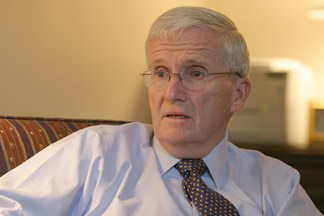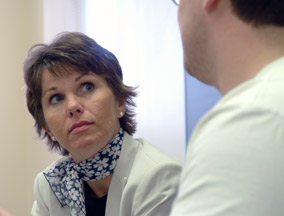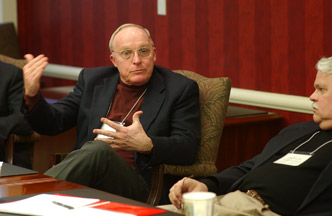Wabash College President Andrew T. Ford has announced that the Center of Inquiry in the Liberal Arts at Wabash College has received $12.5 million in funding from Lilly Endowment Inc. The grant will support activities of the Center of Inquiry, which was founded by a $20.8 million Lilly Endowment Inc. grant in 2000, for an additional five years.
 "The past five years have been a period of extraordinary vitality for Wabash College, in no small measure due to the impetus of the Lilly Endowment grant that led to the enhancement of the liberal arts education of Wabash students, the engagement of Wabash faculty, and inquiries about aspects of the liberal arts," said Ford. "During the next five years, Wabash will build on successes of the past five years and reorganize our program structure based on current needs, opportunities, and new understandings gained from the experience of the Center of Inquiry in the Liberal Arts at Wabash College."
"The past five years have been a period of extraordinary vitality for Wabash College, in no small measure due to the impetus of the Lilly Endowment grant that led to the enhancement of the liberal arts education of Wabash students, the engagement of Wabash faculty, and inquiries about aspects of the liberal arts," said Ford. "During the next five years, Wabash will build on successes of the past five years and reorganize our program structure based on current needs, opportunities, and new understandings gained from the experience of the Center of Inquiry in the Liberal Arts at Wabash College."
The focus of the Center of Inquiry in the next five years will be a servant of excellence in the liberal arts in three main interrelated categories: servant of excellence in the liberal arts at Wabash College; in the disciplined reflection and research in inquiries on liberal arts education; and in liberal arts activities engaging other liberal arts colleges and universities and partner organizations that serve them.
The recent documentary Declining by Degrees, produced by the Public Broadcasting System, reveals challenges faced by colleges and universities, calls for accountability and assessment of educational outcomes, and points to needs that the Center of Inquiry hopes to meet. Wabash’s Center of Inquiry engages in inquiries to discover those practices that enhance education of diverse students and to produce information and programs that will help colleges and universities meet pressing challenges.
"The grant creates an extraordinary opportunity for Wabash College, Wabash College students, and the many liberal arts colleges and universities that have collaborated with the Center of Inquiry over the last five years," said President Ford. "Wabash faculty will have the resources to strengthen Wabash’s existing programs and create powerful new experiences in the liberal arts for Wabash students. The grant also will advance the Center of Inquiry’s ongoing work with liberal arts institutions to document and strengthen the impact of liberal arts education for the nation’s students."
 In the forthcoming five-year grant period, Wabash College will:
In the forthcoming five-year grant period, Wabash College will:
• Develop a program of Lilly Teaching Fellows. The grant will fund Lilly Teaching Fellows whose presence on campus will allow for release time for Wabash faculty to study their own disciplines through the lens of the liberal arts, and allow for additional courses in small departments.
• Develop a program of Lilly Liberal Arts Student Interns. Eighteen Wabash students each year will intern with the Center of Inquiry in the Liberal Arts as research assistants for Wabash faculty and in leading and participating in discussions and conferences on the liberal arts.
• Develop a new model of Academic Program Review. The Center of Inquiry will support a series of activities that facilitate a discussion and engagement of faculty, staff, and students in a holistic review of the College’s academic program. The grant will also support the visits of two consultants each semester (for three semesters) to facilitate constructive discussions for an effective review of Wabash’s academic program.
• Develop a new model for Departmental Program Reviews. The grant will allow two academic departments per year to apply for a Lilly Teaching Fellow, a Lilly Student Liberal Arts Intern, a colloquy involving colleagues from other institutions; a program at a national meeting, a student conference, and a supplement to the department budget for the year of the review and the year following it to incorporate results of the review.
• Develop a series of programs that allow all Wabash constituents to reflect on the nature of the liberal arts. The Center of Inquiry will sponsor visits by high school guidance counselors to learn from them prevailing views of liberal arts education held by high school students and their parents. Wabash students — freshmen through seniors — will benefit, as well. Enhanced freshman orientation activities and revised Freshman Tutorials will focus more clearly on the liberal arts. Cultures and Traditions, Wabash’s all-sophomore course, will include an enhanced focus on the liberal arts. Junior students will benefit through departmental projects that allow students to focus on the liberal arts in the context of their major. And seniors will be involved in week-long discussions of the liberal arts in preparation of Senior Comprehensive Exams.
• Support inquiries and projects for course development. Faculty will receive release time and mini-grants to enhance and revise courses with a focus on liberal arts learning outcomes.
• Support the Blackboard information technology platform. Blackboard will be supported by the grant for a period of two years, during which a careful analysis of the system to determine the best practices in using such technology.
• Develop an ongoing program to extend the classroom. The Center of Inquiry has supported the development of "immersion learning" courses that allow Wabash faculty to take students in their courses to the source of the learning — around the world. The grant will provide support for immersion experiences for Wabash students; support for faculty members to explore opportunities within their discipline; and support an inquiry on the effectiveness of such immersion experiences in producing positive liberal arts outcomes.
 • Develop a series of conferences at Wabash College specific to the liberal arts. The grant will support topical conferences driven by Wabash faculty in their disciplines, and more broad conferences on best practices in liberal arts education.
• Develop a series of conferences at Wabash College specific to the liberal arts. The grant will support topical conferences driven by Wabash faculty in their disciplines, and more broad conferences on best practices in liberal arts education.
The grant also will fund partially the Wabash National Study of Liberal Arts Education, a comprehensive, longitudinal study of 5,500 students at 18 participating institutions, including Wabash. Colleges involved in the groundbreaking study range from community colleges to major research universities.
"The Wabash National Study of Liberal Arts Education is the most comprehensive study of the liberal arts ever undertaken," added Charles Blaich, director of inquiries at the Center of Inquiry. "This massive, multi-institution study was developed through a collaboration of the finest higher education researchers in the country. The study will follow thousands of students through four years of college at 18 institutions across the country. We will examine the impact of study abroad, first-year programs, living learning communities, teaching quality and organization, student-student interactions, and many other aspects of students’ in- and out-of-classroom college experience. The study’s findings will help liberal arts colleges and universities document and strengthen the quality of liberal arts education for their students."
For more information see: